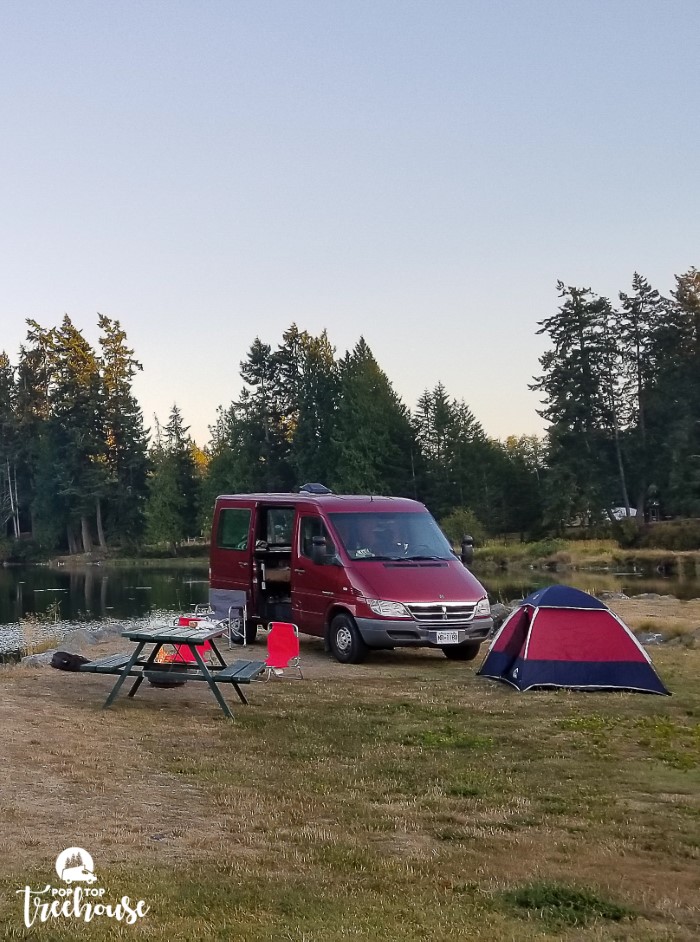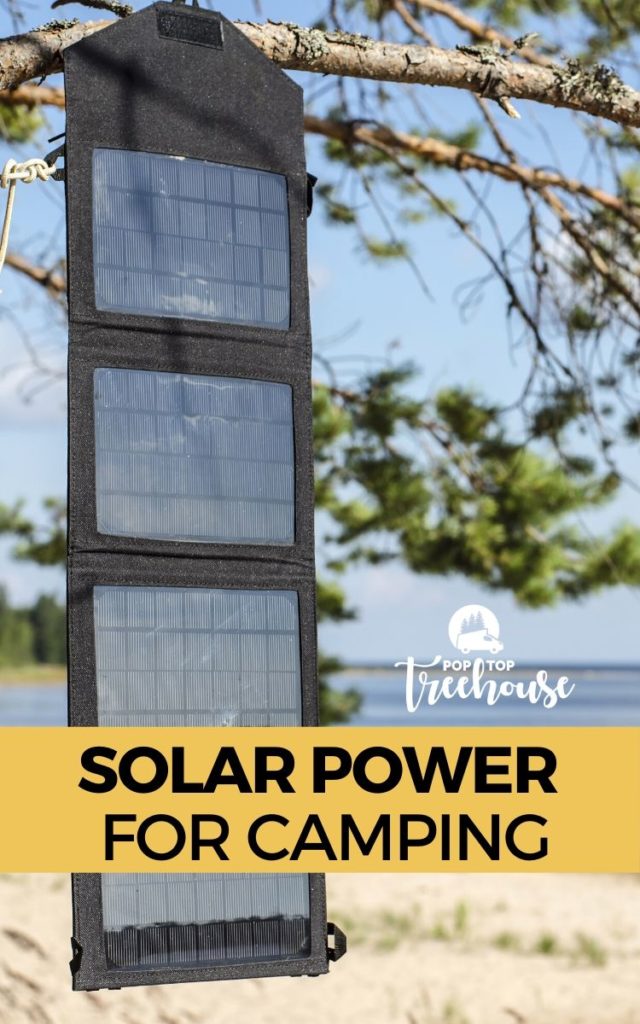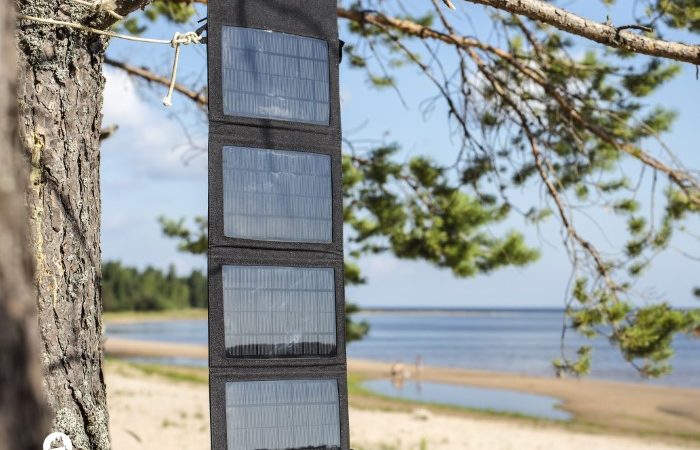I try to approach all of my camping trips with an eco-conscious mindset. It is a time for us to connect with the outdoors and I want to ensure I show my appreciation to mother nature when I am there. There are so many ways we can make a camping trip greener.
Your “footprint” isn’t just how much trash you generate on a camping trip, it also involves the kind of energy you use. That’s where solar power comes in. Instead of hooking devices up to your car or using a generator, you can set up a solar grid to recharge them. And there are plenty of devices with their own individual solar set-up, making it easier than ever to use solar power for camping. Here’s how you can incorporate solar power into your camping routine.
Set Up a Solar Grid
There are tons of reasons that you might want access to power while you’re camping. While we all wish for unlimited vacation days, you might not have the option of stepping away from work completely and need to keep up with your email and voicemails. You may have organized a complicated camping trip for a large group and are using online spreadsheets. Or maybe you just want to have a movie night in your tent with the kiddos. All of these are great reasons to set up a solar grid.
Solar grids consist of both solar panels and batteries. You can buy a solar panel alone and use it to charge your devices, but pairing it with a battery gives you increased flexibility. They allow you to leave the solar panel out in full sun to charge the battery during the day while you take your devices on your adventures. Then at night, you can recharge your devices with the fully charged battery. If you decide to buy a solar generator rather than setting up a solar grid, it will come with a built-in battery.

How Much Power Do You Need?
Solar panels come in many different wattages so the first thing you will need to do to is calculate how much power you’ll need. Figure out how much wattage or voltage is required by the electronics you want to bring with you. You can keep your cell phone battery charged for the weekend with just a 5-watt solar panel. The larger the electronics and the more of them you want to charge, the higher the wattage you’ll need.
When purchasing a battery to go with your solar panels, look at its watt-hour storage. Buying a battery with higher energy storage potential will allow you to use the battery to charge more devices. A battery with 400 watt-hours or more will allow you to recharge several devices several times.
You should also consider how much the battery weighs, as you’ll obviously be traveling with it. Lithium batteries are significantly lighter than lead-acid ones, so they’re ideal for camping and hiking. Be realistic about how much wattage you will need and try to not to go too far over or under your estimate.
There are many solar kits available and ready to do. You can even find brand names to take you off grid, such as Renogy, at your local camping store or online on Amazon. You can always customize your own set-up and order items individually by purchasing the solar charger battery bank and panels separately.
Solar panels are rated for the wattage they can get with the best-case scenario of full sunlight. To fully charge your battery and devices, set up your solar panels away from anything that could block out the light. A cloudy day or dappled sunlight from tree leaves will make a negative impact on how much the solar panels can charge your battery. These are full sun lovers!
Solar-Powered Devices
If you don’t think you need a full solar kit, there are other options on how you can lessen your camping footprint. You can buy many devices that have built-in solar panels so you don’t have to use your solar grid to charge them. Many of these devices are traditionally powered by batteries or electricity, so switching to solar power makes for a more eco-friendly trip. As an added bonus, you won’t have to worry about checking and replacing their batteries before every camping trip (AKA one less thing to put on that never-ending camping to-do list).
Solar-Powered Lanterns
There are a ton of solar-powered camping lanterns on the market these days. Some have built-in solar panels, while others plug into separate solar panels to charge. You can leave them outside to charge in the sun during the day and they’ll be ready when you need them as a light source at night.
Radio with Solar Power
It’s always a good idea to pack a radio in your emergency kit in case you can’t access the news via your smartphone. Having a solar-powered radio means that you won’t forget to replace its batteries and can listen to the news to get information on weather and emergency conditions when you really need it.
Cooler Powered by the Sun
If you’ll be on the road for a while and won’t have access to ice, a solar-powered cooler could be the answer to your problems. While expensive, these solar-powered coolers can also be plugged in or run off of batteries to keep your food cold. There are also standard coolers that include a solar-powered light that illuminates the interior when you open the top of the cooler, making it easier to grab those inevitable midnight snacks.
Solar-Powered Backpack
A solar-powered backpack allows you to charge small devices like cell phones on the go. Most have a detachable solar panel with a lithium polymer battery built in. The battery has a USB output so you can plug in any charging cable. Solar-powered backpacks are most helpful when you’re going on a multi-day or long-term hiking trip and will be off-grid for long periods of time.
Camping Shower Heated by Solar Power
When you’re camping, having access to a hot shower is a godsend. At home, we really do take advantage of hot water straight from the tap! Fortunately, a solar-powered camping shower makes this possible even when you’re off the grid. The shower resembles a black bag with a tube and showerhead coming off of it. Fill up the bag with water and leave it out in the sunshine during the day. The black bag absorbs the sunlight, turning it into heat, and transferring it to the water. The water will remain warm even after the sun has gone down, providing you with the luxury of a warm shower at the end of the day.
Solar Panels for RVs
If you own an RV, installing solar panels is one of the best things you can do to reduce your environmental impact. It also gives you the freedom to travel anywhere without worrying about where you will plug in for electrical power, opening you up to many more site options.
Solar panels for motorhomes, travel trailers, and campers work the same way as residential solar installations. They convert sunlight into electricity so it can be used to power appliances and devices. An RV’s solar panel setup will be much smaller than a residential one. You can install solar panels on the roof of your RV or purchase portable solar panels that are easy to set up and put away when you need to get on the road.
For your RV solar energy setup, you’ll need solar panels, a charge controller, solar batteries to store energy, and an inverter to convert DC electricity to AC electricity. It’s important to thoroughly research how many solar panels your motorhome will need, as well as how to install the system in your RV. Installing solar panels is pricey and doesn’t make financial sense for every RV owner. But if you travel in your motorhome frequently and don’t always have a place to plug in to electricity, solar panels may be a good option for you.
While solar systems are a great way to lower your carbon footprint, they also allow to you become much more self-reliant while camping. The freedom of not needing to worry about finding campsites with electrical hookups or worrying about how to make your batteries last a whole weekend will make your camping trip that much easier and stress-free.
When you use solar power for camping, you don’t have to give up all of your devices, comforts, and connection to home. Solar power can also be incorporated into practical camping equipment, like lanterns, and emergency gear, such as radios. With solar power, you can reduce your environmental impact while camping by using sustainable energy. Since solar makes Mother Nature happy, and camping in Mother Nature makes us happy, it’s a win-win situation for all!
Save this Post on Pinterest



 Crustless Mini Bite-Sized Cheesecakes
Crustless Mini Bite-Sized Cheesecakes
